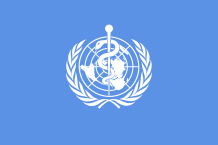 Millions of dollars given by major pharmaceutical companies to the World Health Organization (WHO) raise questions of compliance with the organization’s guidelines on interactions with commercial enterprises. It is notable that the draft Framework of Engagement with Non-State Actors (FENSA) currently being finalised by WHO Member States does not contain a provision that requires a commercial enterprise to conform to WHO’s polices, norms and standard. In a new article, K M Gopakumar from Third World Network (TWN) presents the amount of financial contributions by pharmaceutical companies to the WHO and sets out why these contributions are in conflict with WHO’s criteria for ethical promotion of medicines and accordingly the Guidelines.
 |
| Picture by Yann Forget |
In a post on the blog „Business & Human Rights in Ireland” Shane Darcy summarizes his impressions of the United Nations Business and Human Rights Forum, held in Geneva from 16 – 18 November, giving a good overview of the current state of the process. The annual event saw 2,300 attendees, representing States, business, civil society, academia and various international organisations. It also offered the chance to participate in numerous discussion panels and side events over three days touching on almost every aspect of the field of business and human rights. In regard to the initiative for a business and human right treaty the post explains several issues, including the relationship between the treaty process and the United Nations Guiding Principles, whether the treaty should be applied to transnational companies only or include national companies and the position of non-state actors in international law. It closes remarking on the fact that tax evasion was only touched on in passing for most of the event.
 |
| Photo: Private archive of Alfred de Zayas |
In an article for The Guardian, Alfred de Zayas, UN independent expert on the promotion of a democratic and equitable international order, argues that investor-state dispute settlement (ISDS) should be abolished as it puts investors rights before human rights. He outlines a number of cases in which investors sued governments over environment regulations or health standards and won, showing how commercial interests trump human rights considerations. He argues that respect for human rights must prevail over commercial laws and that it is time for the UN General Assembly to convene a world conference to put human rights at the centre of the international investment regime. In this context, a binding treaty on business and human rights is long overdue. 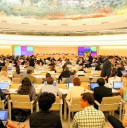 The 87-88 double issue of the South Bulletin titled "Business and Human Rights: Commencing discussions on legally binding instrument", which was released by the South Centre, publishes a number of detailed reports on the first meeting of the Human Rights Council's Working Group on a legally binding instrument on TNCs and other business enteprises with respect to human rights in July 2015. The reports in this Bulletin include general overviews; the scope of application of the instrument; the obligations of states and businesses; standards for legal liability and building mechanisms for access to remedy. The opening speeches of the Chairperson and a Special Rapporteur are also included. 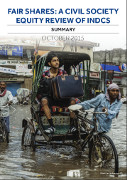 The full report has now been released, the link can be found in this article. A review of country climate targets reflecting the twin pillars of science and equity has been released by civil society ahead of the UN climate conference in Paris. The new report, Fair Shares: A Civil Society Equity Review of INDCs shows that there is still a big gap between what it will take to avoid catastrophic climate change, and what countries have put forward so far. It is an independent review, supported by social movements, environmental and development NGOs, trade unions, faith and other civil society groups from all over the world. The report argues that while equity is a core principle in the UN process to find a new global climate deal, countries have so far been allowed to determine their own targets (INDCs - Intended Nationally Determined Contributions) on a purely national basis without reference to the scale of the global effort needed or what is fair. It warns that we have 10 – 15 years to implement significant emissions reductions to prevent climate change spiralling out of control. 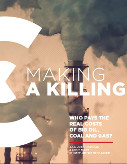 The Climate Justice Programme launched a report titled “Making a killing – who pays the real costs of big oil, coal and gas”. The report looks at the costs of climate change through extreme events, such as droughts or storms and slow-onset events such as the rising sea levels, and compares it to the profits made by carbon majors in the same periods. To address these disparaties it suggests the “Carbon Levy Project”. The suggested mechanism would extract a levy from carbon majors for every ton of CO2 emissions caused. The money generated would then be used for the international mechanism for loss and damage, unlocking additional funding to fight climate change and holding those responsible who caused a major part of it. 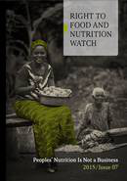 “As the authors of this enlightening volume of the Watch make clear, nutritional adequacy and well-being are integral dimensions of the right to adequate food—and must be dealt with as such. Peoples’ nutrition and food sovereignty risk being undermined by predatory agri-business practices that relentlessly pursue maximum profit at all costs.” “As the authors of this enlightening volume of the Watch make clear, nutritional adequacy and well-being are integral dimensions of the right to adequate food—and must be dealt with as such. Peoples’ nutrition and food sovereignty risk being undermined by predatory agri-business practices that relentlessly pursue maximum profit at all costs.”Hilal Elver, UN Special Rapporteur on the Right to Food The Right to Food and Nutrition Watch report "Peoples Nutrition Is Not a Business" places the spotlight on nutrition and the impact of business operations on people’s livelihoods. In doing so, their assessment goes beyond the measurement of nutrients in food and human bodies to considering the socio-economic and cultural context in which human beings feed themselves. The paper also provides recommendations for states to prevent and punish initiatives that hamper the enjoyment of the right to adequate food and nutrition. The Arab NGO Network for Development (ANND) has published a booklet titled ‘Rethinking the development paradigm: Reflections from civil society in the region on Post2015 and Financing for Development’. Some of the central topics are the role the private sector has been given in the Post2015 development agenda and the diminished support for civil society organizations in the region. This shift in stakeholder roles comes before the adoption of “business-binding human rights standards.” In the global partnership for development the focus has shifted towards private sector involvement while minimizing the goals for fair trade, debt relief and neglecting the regulation and control of capital movement. As part of the involvement of civil society in the arab track of sustainable development goals ANND has organized forums parallel to the arab economic and social summit, in which proposals and recommendations for the summit were made. The documents in this booklet include analysis of most prominent arab development challenges and tackle on some of the elements of the alternative development model.
 |
| Picture by Taguelmoust |
A few days ago, on 26 September 2015, the first suspect in the Mali investigation, Ahmad Al Mahdi Al Faqi was surrendered to the International Criminal Court (ICC) by the authorities of Niger. The charges against him centre on the destruction of cultural heritage during the war in Mali 2012. It is the first case at the ICC in which war crimes against cultural heritage are the main accusation, which is particularly timely in light of the vicious trend of deliberate destruction of cultural heritage we have witnessed in Syria and Iraq at the hands of Islamic State. 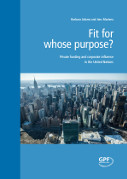 More than a hundred Heads of State and Government will gather in New York this week to adopt the 2030 Agenda for Sustainable Development. This agenda is intended to make the UN ‘fit for purpose’, but it is important to ask, ‘whose purpose will it be fit for’? A new study from Global Policy Forum warns that the United Nations is embarking on a new era of selective multilateralism, shaped by intergovernmental policy impasses and a growing reliance on corporate-led solutions to global problems. The changing funding patterns of the UN and its funds, programmes and specialized agencies reflect these alarming trends. Key features are the growing gap between the scale of global problems and the (financial) capacity of the UN to solve them; the growing share of non-core contributions and earmarked trust funds in UN finance; increased reliance on the corporate sector; and the outsourcing of funding and decision-making to exclusive global partnerships. | 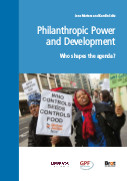 A new GPF working paper, jointly published with Brot für die Welt and MISEREOR, examines the role and impact of philanthropic foundations in development. It addresses the impacts and side effects of philanthropic engagement by taking a closer look at the priorities and operations of two of the most prominent foundations, the Rockefeller Foundation and the Bill & Melinda Gates Foundation, in two crucial sectors, health and agriculture. So far, there has been a fairly willing belief among governments and international organizations in the positive role of philanthropy in global development. But in light of experiences in the areas of health, food, nutrition and agriculture, which are discussed in this working paper, a thorough assessment of the impacts and side effects of philanthropic engagement is necessary. The important role being allocated to the philanthropic sector in the 2030 Sustainable Development Agenda makes the discussion of its role a matter of urgency.
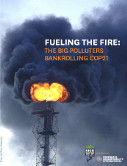 |
| Photo: Les Gibbon, Greenpeace |
Corporate Accountability International has released a report about corporations sponsoring the COP21 summit next week. The report, titled “Fueling the Fire: The big polluters bankrolling COP21” analyses the track record of four major sponsors: Engie (formerly GDF Suez) and Suez Environnement, BNP Paribas and Électricité de France (EDF). It sheds light on the pollution caused by the companies as well as their greenwashing and lobbying activities and their interference with the climate summit. It concludes that there is an inherent conflict of interest in letting major polluters sponsor the COP21, and suggests regulation similar to the WHO Framework Convention on Tobacco Control to safeguard the process against conflicting interests. 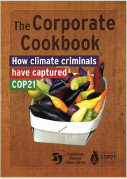 Coming up to the UN climate talks in Paris bound to start next week, the Corporate Europe Observatory has taken a look at what is being cooked up by big business for the negotiations. This report highlights five “key ingredients” ranging from short-terminism, to the advocacy of fossil fuels, especially natural gas, market mechanisms, technologies that are yet to be discovered and continually promoting already existing methods such as industrial agriculture. The report concludes that the results of the Paris negotiations will offer little to the climate; however it could be an important turning point in terms of de-legitimising the dangerous and destructive role that corporate climate criminals are currently playing in climate policy-making. 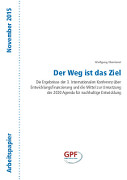 The summits and conferences of 2015, from Addis Ababa to New York and Paris, will have lasting effects on environmental and development policies in the years to come. However, the direction the international community is headed does not only depend on the goals and targets set during the conferences, but also on the political will to realize these targets, and to provide the resources needed. This Global Policy Forum working paper (only available in German) examines the implementation targets of the Financing for Development Conference in Addis Ababa as well as the positions of the respective actors going into the conference, analyses the means of implementation laid down in the 2030 Agenda and assesses whether they will be sufficient to accomplish the broad goals of the sustainable development agenda. In response to a 'non paper' prepared by the WHO secretariat, a number of NGOs, among them the Baby Food Action Network and the Third World Network, have sent a letter to the Director General of WHO, calling on her to protect the UN and overall policy-making from corporate takeover. The WHO 'non paper' states that the Framework of Engagement With Non State Actors (FENSA), currently under negotiation at the WHO, might have “detrimental consequences on the work of the WHO”. The NGOs undersigned on the letter are concerned, that the WHO might remain open to corporate capture and outside influences without a robust framework, which FENSA could provide. A robust framework, they argue, is essential to protect the integrity, independence and credibility of WHO as it carries out its essential norm-setting tasks. 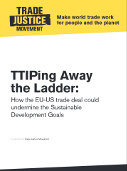 In light of the adoption of the 2030 Agenda and the Sustainable Development Goals (SDGs) in September, the question how other international agreements interact with SDGs is highly interesting. The Trade Justice Movement (TJM) has published a report which scrutinizes the effects of the Transatlantic Trade and Investment Partnership (TTIP) on the SDGs and developing countries. The report “TTIPing Away the Ladder” finds that, in a number of points, TTIP will interfere with the implementation of the SDGs and the ability of developing countries to improve their situation. It argues that especially the ability of countries to develop their own strategies for development is hampered by TTIP. The trade agreement will also lead to more CO2 emissions and weaken the position of developing countries in future trade negotiations. The BEPS Monitoring Group, a network of specialists concerned with the effects of international taxation on development and the reform of the international system for the taxation of transnational corporations, has recently published their General Evaluation of the BEPS Project outputs. While acknowledging the importance of the results as a first step towards a better taxation system, the report highlights a range of shortcomings. The proposals do not suggest treating multinational enterprises as a single firm, instead they emphasize the independent entity principle. Other proposals, such as the access to country by country reporting, contain unnecessary obstacles where publication would have been an easier solution. The proposals are a patch-up of existing rules, not a coherent and comprehensive set of reforms. The BEPS has, however, succeeded in opening space for more far-reaching changes. 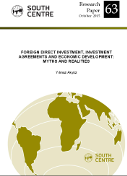 In the recently released paper 'Foreign Direct Investment, Investment Agreements and Economic Development: Myths and Realities' by South Centre, Yilmaz Akyüz examines the effects of Foreign Direct Investment (FDI) on emerging and developing economies and how it can be used to benefit them. The paper critically assesses the benefits commonly ascribed to FDI and clarifies that only a small percentage of FDI is a long term, stable, cross-border flow of capital that adds to productive capacity, helps meet balance-of-payments shortfalls, transfers technology and management skills, and links domestic firms with wider global markets. Additionally the paper reviews the effects of the WTO and Bilateral Investment Treaties on the ability of emerging and developing economies to regulate FDI, before closing with policy recommendations derived from the analysis.  Barbara Adams, with the Global Policy Forum, talked about the money the U.S. contributes to the United Nations and how that amount compares to contributions by other countries. She also discussed the efficiency of U.N. programs. This program was part of C-SPAN’s “Your Money” series. Each Monday morning the last hour of “Washington Journal” is devoted to a federal program, focusing on its mission, participants, and cost. Moren than 40 European NGOs write to their respective Ministers of Finance and to the European Commission to call for a strong outcome of the upcoming EU negotiations on public country by country reporting for multinational corporations under the Shareholders Rights Directive. Ending the secrecy surrounding the tax payments and economic activities of multinational corporations is a crucial step towards re-establishing public trust in our tax system. By requiring multinational corporations to report publicly on key financial data on a country by country basis, governments will also dramatically increase the incentive for these corporations to pay their taxes in the jurisdictions where the economic activity takes place and value is created. This is not only key to achieving financial stability and development in Europe, but also in the world’s poorest countries, where corporate tax avoidance is strongly undermining sustainable development and the fight against poverty, public country-by-country reporting is the most cost effective and efficient way of ensuring they have timely and low-cost access to this crucial information. Public country by country reporting will also help flag up corruption risks by shedding light on any special arrangements between companies and governments. |
 Millions of dollars given by major pharmaceutical companies to the World Health Organization (WHO) raise questions of compliance with the organization’s guidelines on interactions with commercial enterprises. It is notable that the draft Framework of Engagement with Non-State Actors (FENSA) currently being finalised by WHO Member States does not contain a provision that requires a commercial enterprise to conform to WHO’s polices, norms and standard. In a new article, K M Gopakumar from Third World Network (TWN) presents the amount of financial contributions by pharmaceutical companies to the WHO and sets out why these contributions are in conflict with WHO’s criteria for ethical promotion of medicines and accordingly the Guidelines.
Millions of dollars given by major pharmaceutical companies to the World Health Organization (WHO) raise questions of compliance with the organization’s guidelines on interactions with commercial enterprises. It is notable that the draft Framework of Engagement with Non-State Actors (FENSA) currently being finalised by WHO Member States does not contain a provision that requires a commercial enterprise to conform to WHO’s polices, norms and standard. In a new article, K M Gopakumar from Third World Network (TWN) presents the amount of financial contributions by pharmaceutical companies to the WHO and sets out why these contributions are in conflict with WHO’s criteria for ethical promotion of medicines and accordingly the Guidelines.

 The 87-88 double issue of the South Bulletin titled "Business and Human Rights: Commencing discussions on legally binding instrument", which was released by the South Centre, publishes a number of detailed reports on the first meeting of the Human Rights Council's Working Group on a legally binding instrument on TNCs and other business enteprises with respect to human rights in July 2015. The reports in this Bulletin include general overviews; the scope of application of the instrument; the obligations of states and businesses; standards for legal liability and building mechanisms for access to remedy. The opening speeches of the Chairperson and a Special Rapporteur are also included.
The 87-88 double issue of the South Bulletin titled "Business and Human Rights: Commencing discussions on legally binding instrument", which was released by the South Centre, publishes a number of detailed reports on the first meeting of the Human Rights Council's Working Group on a legally binding instrument on TNCs and other business enteprises with respect to human rights in July 2015. The reports in this Bulletin include general overviews; the scope of application of the instrument; the obligations of states and businesses; standards for legal liability and building mechanisms for access to remedy. The opening speeches of the Chairperson and a Special Rapporteur are also included. The full report has now been released, the link can be found in this article.
The full report has now been released, the link can be found in this article. The Climate Justice Programme launched a report titled “Making a killing – who pays the real costs of big oil, coal and gas”. The report looks at the costs of climate change through extreme events, such as droughts or storms and slow-onset events such as the rising sea levels, and compares it to the profits made by carbon majors in the same periods. To address these disparaties it suggests the “Carbon Levy Project”. The suggested mechanism would extract a levy from carbon majors for every ton of CO2 emissions caused. The money generated would then be used for the international mechanism for loss and damage, unlocking additional funding to fight climate change and holding those responsible who caused a major part of it.
The Climate Justice Programme launched a report titled “Making a killing – who pays the real costs of big oil, coal and gas”. The report looks at the costs of climate change through extreme events, such as droughts or storms and slow-onset events such as the rising sea levels, and compares it to the profits made by carbon majors in the same periods. To address these disparaties it suggests the “Carbon Levy Project”. The suggested mechanism would extract a levy from carbon majors for every ton of CO2 emissions caused. The money generated would then be used for the international mechanism for loss and damage, unlocking additional funding to fight climate change and holding those responsible who caused a major part of it. “As the authors of this enlightening volume of the Watch make clear, nutritional adequacy and well-being are integral dimensions of the right to adequate food—and must be dealt with as such. Peoples’ nutrition and food sovereignty risk being undermined by predatory agri-business practices that relentlessly pursue maximum profit at all costs.”
“As the authors of this enlightening volume of the Watch make clear, nutritional adequacy and well-being are integral dimensions of the right to adequate food—and must be dealt with as such. Peoples’ nutrition and food sovereignty risk being undermined by predatory agri-business practices that relentlessly pursue maximum profit at all costs.”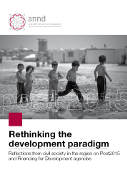

 More than a hundred Heads of State and Government will gather in New York this week to adopt the 2030 Agenda for Sustainable Development. This agenda is intended to make the UN ‘fit for purpose’, but it is important to ask, ‘whose purpose will it be fit for’?
More than a hundred Heads of State and Government will gather in New York this week to adopt the 2030 Agenda for Sustainable Development. This agenda is intended to make the UN ‘fit for purpose’, but it is important to ask, ‘whose purpose will it be fit for’?  A new GPF working paper, jointly published with Brot für die Welt and MISEREOR, examines the role and impact of philanthropic foundations in development. It addresses the impacts and side effects of philanthropic engagement by taking a closer look at the priorities and operations of two of the most prominent foundations, the Rockefeller Foundation and the Bill & Melinda Gates Foundation, in two crucial sectors, health and agriculture. So far, there has been a fairly willing belief among governments and international organizations in the positive role of philanthropy in global development. But in light of experiences in the areas of health, food, nutrition and agriculture, which are discussed in this working paper, a thorough assessment of the impacts and side effects of philanthropic engagement is necessary. The important role being allocated to the philanthropic sector in the 2030 Sustainable Development Agenda makes the discussion of its role a matter of urgency.
A new GPF working paper, jointly published with Brot für die Welt and MISEREOR, examines the role and impact of philanthropic foundations in development. It addresses the impacts and side effects of philanthropic engagement by taking a closer look at the priorities and operations of two of the most prominent foundations, the Rockefeller Foundation and the Bill & Melinda Gates Foundation, in two crucial sectors, health and agriculture. So far, there has been a fairly willing belief among governments and international organizations in the positive role of philanthropy in global development. But in light of experiences in the areas of health, food, nutrition and agriculture, which are discussed in this working paper, a thorough assessment of the impacts and side effects of philanthropic engagement is necessary. The important role being allocated to the philanthropic sector in the 2030 Sustainable Development Agenda makes the discussion of its role a matter of urgency.
 Coming up to the UN climate talks in Paris bound to start next week, the Corporate Europe Observatory has taken a look at what is being cooked up by big business for the negotiations. This report highlights five “key ingredients” ranging from short-terminism, to the advocacy of fossil fuels, especially natural gas, market mechanisms, technologies that are yet to be discovered and continually promoting already existing methods such as industrial agriculture. The report concludes that the results of the Paris negotiations will offer little to the climate; however it could be an important turning point in terms of de-legitimising the dangerous and destructive role that corporate climate criminals are currently playing in climate policy-making.
Coming up to the UN climate talks in Paris bound to start next week, the Corporate Europe Observatory has taken a look at what is being cooked up by big business for the negotiations. This report highlights five “key ingredients” ranging from short-terminism, to the advocacy of fossil fuels, especially natural gas, market mechanisms, technologies that are yet to be discovered and continually promoting already existing methods such as industrial agriculture. The report concludes that the results of the Paris negotiations will offer little to the climate; however it could be an important turning point in terms of de-legitimising the dangerous and destructive role that corporate climate criminals are currently playing in climate policy-making. The summits and conferences of 2015, from Addis Ababa to New York and Paris, will have lasting effects on environmental and development policies in the years to come. However, the direction the international community is headed does not only depend on the goals and targets set during the conferences, but also on the political will to realize these targets, and to provide the resources needed. This Global Policy Forum working paper (only available in German) examines the implementation targets of the Financing for Development Conference in Addis Ababa as well as the positions of the respective actors going into the conference, analyses the means of implementation laid down in the 2030 Agenda and assesses whether they will be sufficient to accomplish the broad goals of the sustainable development agenda.
The summits and conferences of 2015, from Addis Ababa to New York and Paris, will have lasting effects on environmental and development policies in the years to come. However, the direction the international community is headed does not only depend on the goals and targets set during the conferences, but also on the political will to realize these targets, and to provide the resources needed. This Global Policy Forum working paper (only available in German) examines the implementation targets of the Financing for Development Conference in Addis Ababa as well as the positions of the respective actors going into the conference, analyses the means of implementation laid down in the 2030 Agenda and assesses whether they will be sufficient to accomplish the broad goals of the sustainable development agenda. In light of the adoption of the 2030 Agenda and the Sustainable Development Goals (SDGs) in September, the question how other international agreements interact with SDGs is highly interesting. The Trade Justice Movement (TJM) has published a report which scrutinizes the effects of the Transatlantic Trade and Investment Partnership (TTIP) on the SDGs and developing countries. The report “TTIPing Away the Ladder” finds that, in a number of points, TTIP will interfere with the implementation of the SDGs and the ability of developing countries to improve their situation. It argues that especially the ability of countries to develop their own strategies for development is hampered by TTIP. The trade agreement will also lead to more CO2 emissions and weaken the position of developing countries in future trade negotiations.
In light of the adoption of the 2030 Agenda and the Sustainable Development Goals (SDGs) in September, the question how other international agreements interact with SDGs is highly interesting. The Trade Justice Movement (TJM) has published a report which scrutinizes the effects of the Transatlantic Trade and Investment Partnership (TTIP) on the SDGs and developing countries. The report “TTIPing Away the Ladder” finds that, in a number of points, TTIP will interfere with the implementation of the SDGs and the ability of developing countries to improve their situation. It argues that especially the ability of countries to develop their own strategies for development is hampered by TTIP. The trade agreement will also lead to more CO2 emissions and weaken the position of developing countries in future trade negotiations. In the recently released paper 'Foreign Direct Investment, Investment Agreements and Economic Development: Myths and Realities' by South Centre, Yilmaz Akyüz examines the effects of Foreign Direct Investment (FDI) on emerging and developing economies and how it can be used to benefit them. The paper critically assesses the benefits commonly ascribed to FDI and clarifies that only a small percentage of FDI is a long term, stable, cross-border flow of capital that adds to productive capacity, helps meet balance-of-payments shortfalls, transfers technology and management skills, and links domestic firms with wider global markets. Additionally the paper reviews the effects of the WTO and Bilateral Investment Treaties on the ability of emerging and developing economies to regulate FDI, before closing with policy recommendations derived from the analysis.
In the recently released paper 'Foreign Direct Investment, Investment Agreements and Economic Development: Myths and Realities' by South Centre, Yilmaz Akyüz examines the effects of Foreign Direct Investment (FDI) on emerging and developing economies and how it can be used to benefit them. The paper critically assesses the benefits commonly ascribed to FDI and clarifies that only a small percentage of FDI is a long term, stable, cross-border flow of capital that adds to productive capacity, helps meet balance-of-payments shortfalls, transfers technology and management skills, and links domestic firms with wider global markets. Additionally the paper reviews the effects of the WTO and Bilateral Investment Treaties on the ability of emerging and developing economies to regulate FDI, before closing with policy recommendations derived from the analysis. Barbara Adams, with the Global Policy Forum, talked about the money the U.S. contributes to the United Nations and how that amount compares to contributions by other countries. She also discussed the efficiency of U.N. programs. This program was part of C-SPAN’s “Your Money” series. Each Monday morning the last hour of “Washington Journal” is devoted to a federal program, focusing on its mission, participants, and cost.
Barbara Adams, with the Global Policy Forum, talked about the money the U.S. contributes to the United Nations and how that amount compares to contributions by other countries. She also discussed the efficiency of U.N. programs. This program was part of C-SPAN’s “Your Money” series. Each Monday morning the last hour of “Washington Journal” is devoted to a federal program, focusing on its mission, participants, and cost.
Nenhum comentário:
Postar um comentário
Sucesso!